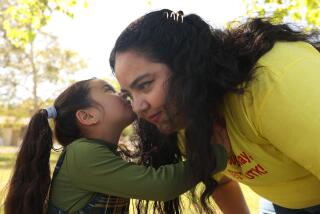My Son is Flunking Pre-Kindergarten
- Share via
My wife, Heidi, came home in tears. She was clutching a handful of papers on which were scrawled various letters of the alphabet, both capital and lower case.
“You’re not going to believe this,” she said between sobs while handing over the evidence.
It looked like something a 5-year-old might have written. In fact, that was the case. Our son, Dylan, had turned 5 literally the day before.
Nonetheless, his squiggly, crooked penmanship was already producing a critical rebuke.
“The teachers are worried that Dylan isn’t picking it up,” my wife explained, as if she were discussing something completely rational rather than utterly ridiculous. “Most of the other kids already know how to do their letters. So they’re concerned about it.”
Here was a child who had just completed his eighth day of summer session pre-kindergarten at a respected private school.
He was barely two years out of diapers and not yet two weeks removed from daily “nappy time.”
He is not attention-deficient. He is not scholastically challenged. He does not have motor skill issues.
He is 5.
Yet my wife was telling me that despite his being a mere two months short of his official entry into kindergarten, our son was expected to draw his letters with perfect symmetry.
When it came time to form that big “C” and little “w,” he was striking out. A pre-K flop. A has-been at 60 months.
Because of this, his mother was taken aside out of earshot and given the hushed-tone “We thought this was something you should know” speech.
“They even asked knowingly, ‘Dylan didn’t attend an academic preschool, did he?”’ my wife recounted, still gripped with anxiety.
We had to admit that we were both shamefully guilty of shortchanging our son’s education as he passed through his “Sesame Street” and “Barney” years.
We irresponsibly encouraged him to stunt his scholastic development at a preschool that emphasized recreation over academics, a school that allowed kids to defer their academic immersion until they were at least potty trained.
So when exactly was it that insanity took hold in the world of early education? When did it become standard procedure to fill parents with insecurity and apprehension over the fact that their 5-year-old might not have what it takes to qualify for the Big K?
Aren’t these teachers who were expressing such illogical angst supposed to, like, teach him how to shape letters correctly?
And if he experienced some problems forming them early on, wouldn’t it make more sense to tell the kid to keep working until he got it right instead of cautioning his mom and dad that their boy was showing signs of being a Remedial Alphabet washout?
It surely makes one wonder where this absurd pressure for very little kids to perform comes from. It is likely a product of yuppie culture run amok, influencing child-prep practices that reward performance and accomplishment while devaluing effort and enjoyment.
Meanwhile, the concept of a child learning at his or her own pace is dismissed as utterly fanciful.
My wife and I are left to question if it’s perhaps we who are out of step. Have we been lax in allowing Dylan to be a regular boy rather than an overachiever-in-training, or is this the troubling outgrowth of My-Kid-Must-Be-the-Best madness that we suspect it is?
To even be focusing this kind of energy mulling the question is no doubt an overreaction.
But the nerve it strikes is a very raw and deep one, slicing to the core of parental responsibility/insecurity issues as well as the nature of learning itself.
You want what’s best for your kid. So you steer clear of what you believe to be the comparatively substandard instruction at the local public school and shell out more than $600 a month to help give your little bundle of potential a leg up.
What’s far fuzzier in this equation is identifying the line that separates nourishing encouragement from unreasonable expectations.
More to Read
Sign up for Essential California
The most important California stories and recommendations in your inbox every morning.
You may occasionally receive promotional content from the Los Angeles Times.













